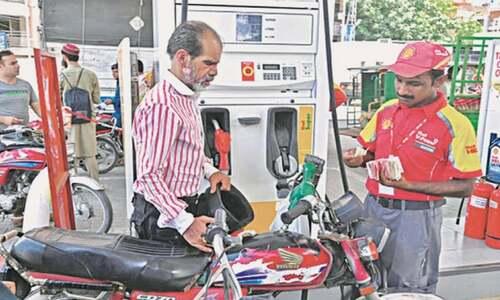While Pakistan State Oil, Shell Pakistan and Attock Petroleum have been the major oil marketing companies, Hascol Petroleum is now elbowing its way into the sector.
The company was incorporated in 2001 and granted a full marketing licence by the government in February 2005. Hascol came in full public view last year when its initial public offering fetched Rs1.4bn. It was listed on May 14, 2014.
Its book-building process was oversubscribed by six times, and the strike price was set at Rs56.50. At the close of trading last Thursday, the stock was tagged at Rs106.93 — providing a return of 89pc in a span of one year. Taking advantage of the booming equity market, more companies have come forward to mobilise resources from the capital market.
Yet, there is no strong group that is backing Hascol Petroleum. “Attock Petroleum is under the fold of the Attock Group; Shell International takes care of Shell Pakistan; the government holds a major stake in PSO; and Parco supports Total,” said a sector expert.
The company always secures its trade debt from commercial sales to IPPs and other debt-burdened institutions through irrevocable financial instruments, thereby shielding itself from the circular debt menace
Hascol seems to be a one-man mission. Its chairman and CEO, Mumtaz Hasan, holds majority equity in the company, whose paid-up capital amounted to Rs906m by March 31. The chairman is believed to offer his personal guarantees in securing bank borrowings.
But the company has a strategic agreement with Fuchs Lubricants, one of the largest global manufacturers of lubricants and an associate of Fuchs Petrolub AG, which is based in Mannheim, Germany.
“This agreement allows Hascol Pakistan to manufacture, import, distribute and sell branded lubricating oils and greases in the country,” said an analyst at Taurus Securities. The company had also acquired a 28.85pc stake in Pakistan Refinery Limited last July, according to a stock exchange filing.
With total assets of Rs15bn, the company nonetheless appears to be moving forward. It primarily deals in three major products: motor spirit (MS), high speed diesel (HSD) and furnace oil (FO).
Market watchers say it has been able to rapidly increase its market share from less than 1pc a couple of years ago to 2.4pc by early last year, according to public information released before its listing.
“Hascol has gradually ramped up its presence in Punjab and Sindh and expanded its retail network,” said a senior analyst. It has also worked to improve its infrastructure to support uninterrupted supplies to its outlets by striking hospitality arrangements with larger oil marketing companies (OMC) like PSO. This has helped the company achieve higher per-outlet sales.
Some suggest it is not bad to be a small player, as they can more easily overcome financial constraints seen in the OMC sector owing to their lower inventory-holding period (which minimises inventory losses), greater sensitivity to recent margin hikes for petrol and HSD, and the ability to increase their market share.
An analyst at Taurus Securities highlighted that Hascol is immune from the hazards of the circular debt, which has plagued other OMCs, particularly PSO. “The company’s main FO customers are Nishat’s independent power producers and Liberty Power. It has maintained a very defensive policy to minimise the risk of burgeoning receivables.”
The analyst pointed out that the company always secures its trade debt from commercial sales to IPPs and other debt-burdened institutions through irrevocable financial instruments. “Resultantly, it remains unharmed from the circular debt menace.”
Hascol earned a profit-after-tax of Rs273m in the quarter ending March (1QCY15), which translated into earnings-per-share of Rs3.02. This was up 46pc from net earnings of Rs187m and eps of Rs2.07 in 1QCY14.
In his report to shareholders, CEO Mumtaz Hasan said the company’s first quarter performance was “outstanding both in terms of volume growth and profitability”. He observed that a major achievement was fine-tuning the company’s supply chain management to ensure that its inventory losses were kept to a minimum.
“Work is also proceeding at a fast pace on the completion of our Daulatpur Depot, which will hopefully be fully operational in the second quarter of 2015. With the completion of this depot, we will be in a position to improve our supply chain dynamics in central Sindh, thereby boosting our HSD and MS volumes and profitability,” he asserted.
Muhammad Affan Ismail, an analyst at BMA Capital, pointed out that the company’s volumetric sales have grown at 14pc compounded annually for the past three years. Sales and earnings are expected to gain further momentum owing to the company’s expanding retail outlet network, reduced prices of motor fuel, and improving industrial activity.
Hascol’s strong cash balance — Rs2bn by end-March — and its steady operating cash generation would also ensure timely completion of key projects, mainly the lubricant and grease plant and LPG stations etc, he added.
Published in Dawn, Economic & Business, May 18th, 2015
On a mobile phone? Get the Dawn Mobile App: Apple Store | Google Play












































